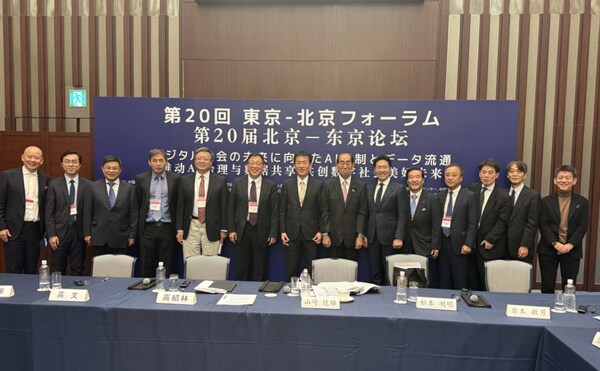TOKYO, Dec. 16, 2024 /PRNewswire/ -- Representatives from China and Japan shared their insights on promoting artificial intelligence (AI) governance and data sharing at a sub-forum of the 20th Beijing-Tokyo Forum in Tokyo recently.

Representatives from China and Japan shared their insights on promoting artificial intelligence (AI) governance and data sharing at a sub-forum of the 20th Beijing-Tokyo Forum in Tokyo recently.
The sub-forum contributed eastern wisdom to AI governance and digital social development, demonstrating the significance of international cooperation for the development of the digital economy, according to Gao Shaolin, advisor at Peking University's Legal Artificial Intelligence Research Center.
AI governance framework
The participants agreed that the next 10 years will be a critical period for the development of AI.
Gao Wen, academician of the Chinese Academy of Engineering (CAE), said since China's State Council issued a guideline on developing AI in 2017, the nation has made significant progress in AI research and development and industrial layout, especially in computing power and 5G network construction.
By the end of 2023, China had over half of the world's 1.57 billion 5G users, according to the World Internet Development Report 2024. It ranked second globally in AI and computing power scale, which has laid a solid foundation for the rapid development of AI.
Tatsuo Yamazaki, project professor at the International University of Health and Welfare, said it was very meaningful for Japan and China to discuss strengthening AI governance rules.
Fumihiko Kamio, research director of the Nomura Research Institute, echoed his view. He emphasized that the core goal of AI technology is to improve productivity and eliminate obstacles to social development, and called on Chinese and Japanese experts to work together to build an AI governance framework to cope with the global challenges.
Deepening international cooperation
China put forth the Global AI Governance Initiative in October last year. In July, the UN General Assembly adopted a China-sponsored resolution on enhancing international cooperation on AI capacity-building.
The participants spoke highly of the Global Cross-Border Data Flow Cooperation Initiative recently proposed by China.
They agreed that AI governance requires global collaboration, especially in the formulation of international standards and the construction of ethical frameworks, where China and Japan can play an active role.
Ding Wenhua, academician of the CAE, said China and Japan have both similarities and differences in technology development and governance priorities, so deepening cooperation will bring unique value to global AI governance.
"China and Japan should deepen AI technology cooperation between enterprises, work together in AI security research, talent exchange, and jointly explore more possibilities for the application of technology," Wang Zhongyuan, president of the Beijing Academy of Artificial Intelligence, said.
Balancing development & risks
AI governance refers to the guardrails established to ensure AI systems and tools remain safe and ethical and respect human rights.
Xu Zhilong, editor-in-chief of Science and Technology Daily, stressed that AI, as a revolutionary technology, has far-reaching impacts on all areas of society and economy.
However, its potential risks such as data leakage and the spread of false information should not be ignored. "Technological progress and security ethics should be developed in a balanced way to ensure that AI technology always serves the progress of human civilization," Xu said.
AI governance should not only heed the current technological ethics issues, but also prevent possible long-term risks, such as AI going out of human control, according to Toshio Iwamoto, senior corporate advisor of NTT DATA. He said AI R&D and application should abide by the principles of fairness, transparency, safety and availability.
Yuan Yue, chairman of Beijing Dataway Horizon, shared his view from the perspective of regulatory models. "Policy choices should be based on the current status and goals of national technological development," Yuan said, adding that China prefers to provide a more friendly development environment for enterprises while ensuring an effective response to risks.



